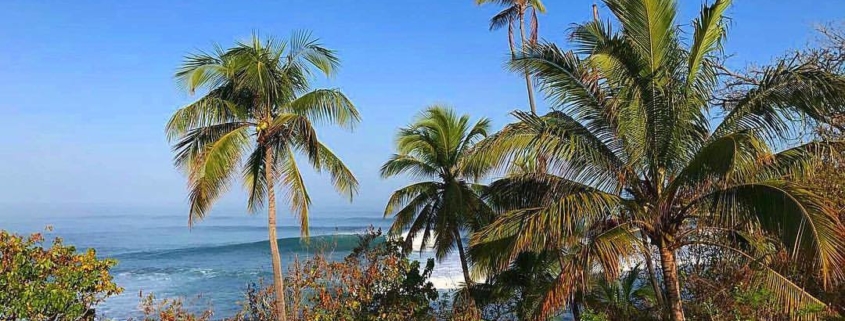What I Learned When Maria Came to Visit
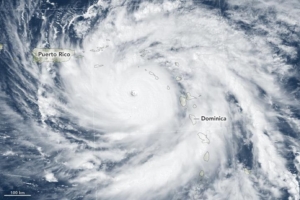
NASA Earth’s Timeline Photo of Hurricane Maria over Puerto Rico
“Dad, the hurricane sent Puerto Rico back to the stone age,” was how my son put it after living through the wrath of Hurricane Maria, and witnessing the extent of the devastation and destruction of the island first hand. Hurricanes, earthquakes, fires, floods are Nature’s reset buttons. Its way to reclaim its space, to rid itself of the old and the dead, create new growth and replenish itself.
It reminds me that we must respect our surroundings and that we mustn’t consider our own survival as an absolute. Rather than razing the land in order to create a new version of the landscape, we ought to consider working with it so that we can engage it in a more balanced and respectful way. Like my Mom would tell my brother and I, when she took us to the beach as kids, “Remember, you don’t have to fear the ocean, but you have to respect it.”
* * *
I’ve spent my entire career as a structural engineer. I endeavor every day to ensure that the artificial environments to which we’re beholden are built to protect the public from those disastrous events that nature might decide to impose. I do the best I know how. I design to meet the latest codes. I use state of the art technology not just to design, but also to build. Yet each time one of these events occurs, we learn something new, something we didn’t know before, because no two are the same. Nature’s diversity is as evident in the landscape as in its expressions of rage. It’s clear that each time we think we’ve got it figured out, it has a way of reminding us that the only thing to figure out is that change is inevitable and that everything is fluid. All we can do is hope for the best given what we know. It’s our way of attempting to control the destiny of our species. Who can blame us? We all want to survive. We all want to thrive.
These days I find myself questioning our methods as engineers, which seem to me, combative. It’s as if we look at Nature as something we need to defend against, rather than embrace, despite it’s occasional and understandable fits of anger. We’ve chosen to view it as an obstacle, or as something to exploit for our comfort. We need to shift our views. We need to recognize it as our ally.
* * *
What we define as progress often comes at the expense of the environment. We impose our will in spaces previously occupied by the living, and transform them into inanimate structures that fail to breathe, or grow, or sustain themselves. We enclose ourselves within walls, made of concrete, or wood, or steel, in an effort to provide shelter from the elements. We presume to gain a sense of privacy, intimacy and longevity by restricting our living space to only what’s on our side of those artificial borders.
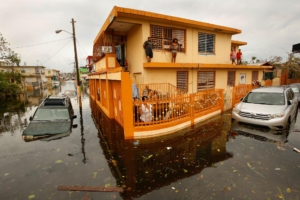
LA Times Timeline Photos
Are we seeking comfort or do we simply want to avoid adapting? Maybe we’re trying to skew evolution altogether, as if we alone can determine not only what lives and what dies, but how it lives and how it dies. While those partitions may in fact protect us at times, they also prevent us from seeing out and truly engaging with our environment.
I’m reminded of this, when I look at a painting I have hanging in my living room wall, by a Cuban artist friend of mine. The background is a fading black and white photograph of a dilapidated building in Old Havana, over which he painted thick blossoming trees where the building columns once stood. While the work is black and white, the columns are outlined in places with distinct white lines, as if announcing themselves, reclaim their space. It’s a statement about nature’s persistence and insistence: regardless of man’s evolution, perceived progress can only be construed as temporary, while Nature is permanent and irrepressible.
* * *
We’ve built in flood plains, near earthquake faults, at the edge of the sea; and we actually believe that our technological know-how will allow this to continue without risk. It reflects an arrogance born of our own sense of omnipotence and it has landed us in a tough spot. We can no more ask all of Mexico City to close down and relocate, than we can move the island of Puerto Rico away from hurricane alley. All we can do now is try to do what we can to protect ourselves the best way possible. But we must do so bearing in mind our past mistakes.
Since he got back from Puerto Rico, my son has been working to make his mother’s house, and mine, both near San Francisco, into more sustainable spaces. “I look at Mom’s house,” he says, “and I see a space that just takes. There are no fruit trees, no water sources other than the one we pay for, no natural energy source. We only take. We give nothing back.”
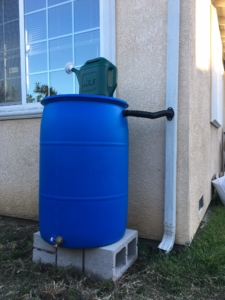
Water tank my son installed. Filled during first rain of the year.
Imagine if in fact we all looked at our immediate spaces and evaluated them with the same concept in mind. What if we gave some thought to giving back to nature within that space, using processes that we can directly control: adding potted plants to help generate oxygen, or reusing shower water to feed those same plants, or growing a fruit tree or two, or planting our own herbs, or storing potable water, or making use of solar and wind power. Even in urban environments there are ways to make this happen. I remember reading about a family where the parents required their children to do a certain amount of exercise for each hour of TV they wanted to watch. So, they plugged their TV set to a power outlet on a generator that was in turn, connected to a stationary bike. For each hour they pedaled, the batteries would store an hour of electricity. Brilliant. Not only did they enforce exercise, but also generated their own electricity without taxing natural resources.
We rail against our current government’s utter disregard for the planet, yet we sometimes fail to see how our own potential contributions can make a difference. All movements that affect change start with the actions of one. I realize that we can’t all buy generators, or afford solar panels, but there is plenty we can do to affect change, even in small quantities, that costs little but yields long term results.
* * *
Sometimes I consider that our planet has seen itself go through several cycles of dissolution and reconstitution. The difference between the previous cycles and this one is that this current slow dissolution is mostly man’s doing. But if we can believe that the planet’s evolution parallels our own, we can begin to accept that a better, more sustainable future is something that we can achieve by altering our view and recognize ourselves as an integral part of it.
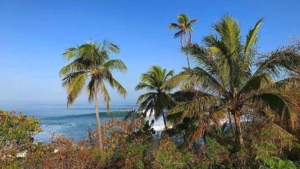 While Puerto Rico has been utterly destroyed, I’d like to think that it has also been given the opportunity to re-build a more sustainable island. For that, they need to be conscientious about how to interact with the environment, as they do in the countryside where lush slopes and reddish soil can provide. Over three quarters of the island still lacks power and there are many without water, but still they remain. Puerto Ricans are left with no choice but to look around and integrate with the surroundings in order to survive. They can become an example for the rest of us follow.
While Puerto Rico has been utterly destroyed, I’d like to think that it has also been given the opportunity to re-build a more sustainable island. For that, they need to be conscientious about how to interact with the environment, as they do in the countryside where lush slopes and reddish soil can provide. Over three quarters of the island still lacks power and there are many without water, but still they remain. Puerto Ricans are left with no choice but to look around and integrate with the surroundings in order to survive. They can become an example for the rest of us follow.
If we are willing to accept that we too can reconstitute ourselves, if we can each see beyond those walls we live within, where trees and other living things once stood, perhaps we will see communities emerge with a deeper sense of responsibility and care for our planet. The actions of one can inspire the actions of many.
* * *
While the news about Puerto Rico has justifiably focused on the devastation of man made systems like infrastructure, highways, waterways and power grids, plenty of the vegetation that gave the island its luscious and vibrant greens was also devastated. But already, the ocean has pulled back; the rivers are finding their paths again. Despite the lack of roads, or electricity, mangoes, avocados and bananas will again grow in the wild.
Puerto Ricans are struggling to get back on their feet. It’s a slow process, but one that bears persistence, and our admiration, for we are witnessing their own version of reconstitution. They’re like the trees in my painting. They remind me that the island will soon enough reclaim its leafy, verdant beauty, on its own. I hold the same hope for Puerto Ricans.
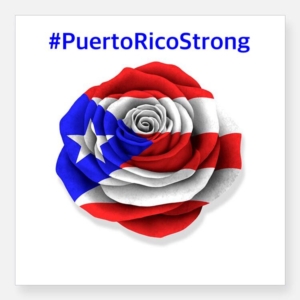
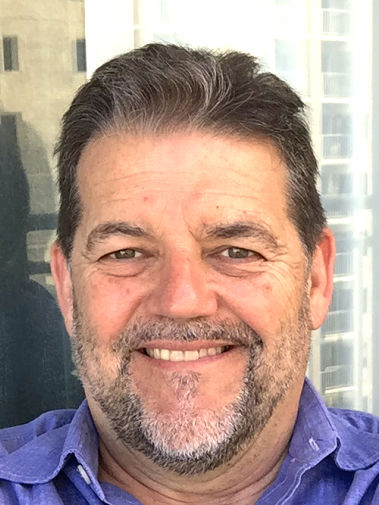 Jesus Francisco Sierra is currently working towards his MFA in Fiction at Antioch University Los Angeles. He emigrated from Cuba in 1969 and grew up in San Francisco’s Mission District. He still resides in the San Francisco Bay Area. Although he has been a lifelong writer and storyteller, he makes a living as a structural engineer. His inspiration, and his most supportive audience, are his adult daughter and son. He is fascinated by how transitions, both sought and imposed, have the power to either awaken or suppress the spirit. His work has previously been published in Marathon Literary Review and The Acentos Review.
Jesus Francisco Sierra is currently working towards his MFA in Fiction at Antioch University Los Angeles. He emigrated from Cuba in 1969 and grew up in San Francisco’s Mission District. He still resides in the San Francisco Bay Area. Although he has been a lifelong writer and storyteller, he makes a living as a structural engineer. His inspiration, and his most supportive audience, are his adult daughter and son. He is fascinated by how transitions, both sought and imposed, have the power to either awaken or suppress the spirit. His work has previously been published in Marathon Literary Review and The Acentos Review.

